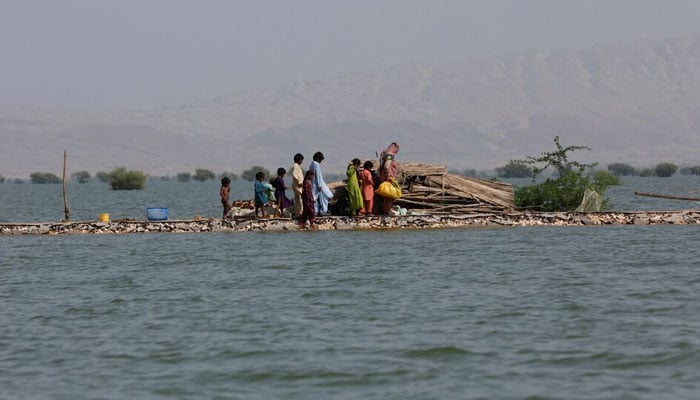Flood prone communities left at mercy of natural hazards
Islamabad:Responding to a survey, conducted by Pattan-Coalition 38 survey in flood-affected riverine areas, majority of the respondents said that the provincial governments have not involved them in any preparedness activity to reduce potential flood risks. Most of the respondents claimed that they have not been consulted in any decision-making, which is a violation of the National Disaster Management Act 2010.
With monsoon season already begun in the country, recent forecasts of the Meteorological Department and Flood Forecast Division has indicated a likelihood of above-average rainfall across the country, particularly in the northern regions, which will significantly increase the risk of riverine flooding, landsliding etc. Keeping in view, unprecedented flood disasters in recent past and climate induced changes, Patan-Coalition 38 conducted survey with 275 individuals (95 women and 180 men) across 62 disaster-prone locations of 19 districts of Khyber Pakhtunkhwa, Punjab, Sindh and Islamabad to gauge local opinions on flood preparedness.
The survey results show that claims by NDMA, PDMAs, and the Federal Flood Commission regarding flood preparedness appear to be largely limited to mere statements and advertisements, with no tangible actions being taken, and no committees comprising local residents have been formed to cope with potential flood risks.
The survey shows that in G-7/2 slum area of Islamabad, a stream runs through, affecting hundreds of households each year during the rainy season. When asked about flood preparedness, the residents reported that no measures (such as stream cleaning) have been undertaken by the CDA, nor has any committee comprising local individuals been formed.
Pattan-Coalition 38 survey team also interviewed residents living along the Nullah Leh in Rawalpindi, specifically in the Gulistan Abad and Azim Abad neighbourhoods. According to the respondents, there has been no cleanup of the Nullah Leh by the government, resulting in the nullah being filled with waste and weeds, obstructing the water flow. Residents stated that no committee exists to address flood risks, nor has any NGO contacted them.
The survey collected opinions from 34 communities in 8 districts of Punjab (Jhang, Sargodha, Bhakkar, Multan, Muzaffargarh, Kot Addu, Dera Ghazi Khan, and Rajanpur), 22 locations in 5 districts of Khyber Pakhtunkhwa (Mansehra, Mardan, Bajaur, Malakand, and Dera Ismail Khan), and 5 locations in 3 districts of Sindh (Dadu, Qambar Shahdadkot, and Thatta). About 75% of respondents reported being affected by river floods, 15% by hill torrents, 1% by landslides, 4% by both river floods and hill torrents, and 5% by both river floods and landslides.
As many as 87% respondents of the survey reported that local people have not been approached or consulted by officials nor any committees have been formed to cope with flood disaster, while only 11% said committees existed but have not been active. Additionally, 59% indicated their village experiences flooding every year, leading to significant financial losses. Furthermore, 34% reported their village has been affected by flooding twice in the last 15 years.
An overwhelming 91% of the respondents stated that governments have not taken measures to cope with flood disaster, while only 7% appeared to believe that some actions were being implemented, such as early warnings and repairs of protective embankments. Additionally, 88% of the respondents also said that in their neighbourhood no NGOs were operating or helping communities should floods come.
The Patan Coalition 38 urged NDMA, PDMAs, and the Federal Flood Commission to take immediate action for flood preparedness. The Coalition suggested DDMAs not be limited to DC offices but must be activated in every district and at community level besides recommending establishment of local committees, ensuring community involvement in all flood preparedness, and improvement in early warning system, which must be in local languages and be accessible to women and differently able persons.
-
 AI Film School Trains Hollywood’s Next Generation Of Filmmakers
AI Film School Trains Hollywood’s Next Generation Of Filmmakers -
 Royal Expert Claims Meghan Markle Is 'running Out Of Friends'
Royal Expert Claims Meghan Markle Is 'running Out Of Friends' -
 Bruno Mars' Valentine's Day Surprise Labelled 'classy Promo Move'
Bruno Mars' Valentine's Day Surprise Labelled 'classy Promo Move' -
 Ed Sheeran Shares His Trick Of Turning Bad Memories Into Happy Ones
Ed Sheeran Shares His Trick Of Turning Bad Memories Into Happy Ones -
 Teyana Taylor Reflects On Her Friendship With Julia Roberts
Teyana Taylor Reflects On Her Friendship With Julia Roberts -
 Bright Green Comet C/2024 E1 Nears Closest Approach Before Leaving Solar System
Bright Green Comet C/2024 E1 Nears Closest Approach Before Leaving Solar System -
 Meghan Markle Warns Prince Harry As Royal Family Lands In 'biggest Crises' Since Death Of Princess Diana
Meghan Markle Warns Prince Harry As Royal Family Lands In 'biggest Crises' Since Death Of Princess Diana -
 Elon Musk Weighs Parenthood Against AI Boom, Sparking Public Debate
Elon Musk Weighs Parenthood Against AI Boom, Sparking Public Debate -
 'Elderly' Nanny Arrested By ICE Outside Employer's Home, Freed After Judge's Order
'Elderly' Nanny Arrested By ICE Outside Employer's Home, Freed After Judge's Order -
 Keke Palmer On Managing Growing Career With 2-year-old Son: 'It's A Lot'
Keke Palmer On Managing Growing Career With 2-year-old Son: 'It's A Lot' -
 Key Details From Germany's Multimillion-euro Heist Revealed
Key Details From Germany's Multimillion-euro Heist Revealed -
 David E. Kelley Breaks Vow To Cast Wife Michelle Pfeiffer In 'Margo's Got Money Troubles'
David E. Kelley Breaks Vow To Cast Wife Michelle Pfeiffer In 'Margo's Got Money Troubles' -
 AI-powered Police Robots To Fight Crime By 2028: Report
AI-powered Police Robots To Fight Crime By 2028: Report -
 Everything We Know About Jessie J's Breast Cancer Journey
Everything We Know About Jessie J's Breast Cancer Journey -
 Winter Olympics 2026: What To Watch In Men’s Hockey Today
Winter Olympics 2026: What To Watch In Men’s Hockey Today -
 Winnie Harlow Breaks Vitiligo Stereotypes: 'I'm Not A Sufferer'
Winnie Harlow Breaks Vitiligo Stereotypes: 'I'm Not A Sufferer'




